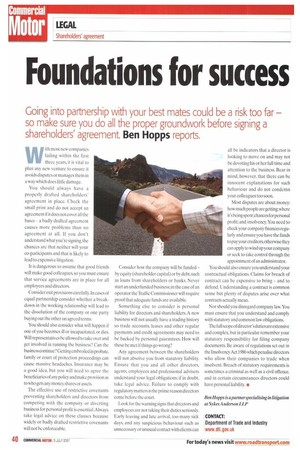Foundations for success
Page 44

If you've noticed an error in this article please click here to report it so we can fix it.
Wjai most new companies failing within the first three years, it is vital to plan any new venture to ensure it avoids disputes or manages them in a way which does little damage.
You should always have a properly drafted shareholders' agreement in place. Check the small print and do not accept an agreement if it does not cover all the bases — a badly drafted agreement causes more problems than no agreement at all. If you don't understand what you're signing, the chances are that neither will your co-participants and that is likely to lead to expensive litigation.
It is dangerous to assume that good friends will make good colleagues, so you must ensure that service agreements are in place for all employees and directors.
Consider exit provisions carefully. In cases of equal partnership consider whether a breakdown in the working relationship will lead to the dissolution of the company or one party buying out the other on agreed terms.
You should also consider what will happen if one of you becomes ill or incapacitated, or dies. Will representatives be allowed to take over and get involved in running the business? Can the business continue? Getting embroiled in probate, family or court of protection proceedings can cause massive headaches. Insurance may be a good idea, hut you will need to agree the beneficiaries of any policy and make provision as to who gets any money, shares or assets The effective use of restrictive covenants preventing shareholders and directors from competing with the company or diverting business for personal profit is essential.Always take legal advice on these clauses because widely or badly drafted restrictive covenants will not be enforceable, Consider how the company will be funded — by equity (shareholder capital) or by debt,such as loans from shareholders or banks. Never start an underfunded business; in the case of an operator the Traffic Commissioner will require proof that adequate funds are available.
Something else to consider is personal liability for directors and shareholders. A new business will not usually have a trading history so trade accounts, leases and other regular payments and credit agreements may need to be backed by personal guarantees. How will these be met if things go wrong?
Any agreement between the shareholders will not absolve you from statutory liability. Ensure that you and all other directors, agents, employees and professional advisers understand your legal obligations: if in doubt, take legal advice. Failure to comply with regulatory matters is the prime reason directors come before the court.
Look for the warning signs that directors and employees are not taking their duties seriously. Early leaving and late arrival, too many sick days, and any suspicious behaviour such as unnecessary or unusual contact with clients can all be indicators that a director is looking to move on and may not be devoting his or her full time and attention to the business. Bear in mind, however, that there can be innocent explanations for such behaviour and do not condemn your colleagues too soon.
Most disputes are about money: how much people are getting;where it's beingspent;chances for personal profit; and insolvency. You need to check your company finances regularly and ensure you have the funds to pay your creditors, otherwise they can apply to wind up your company or seek to take control through the appointment of an administrator.
You should also ensure you understand your contractual obligations. Claims for breach of contract can be expensive to bring — and to defend. Understanding a contract is common sense but plenty of disputes arise over what contracts actually mean.
Nor should you disregard company law. You must ensure that you understand and comply with statutory and common law obligations.
The full scope of director's duties are extensive and complex, but in particular remember your statutory responsibility for filing company documents. Be aware of regulations set out in the InsolvencyAct 1986 which penalise directors who allow their companies to trade when insolvent. Breach of statutory requirements is sometimes a criminal as well as a civil offence, and in certain circumstances directors could have personal liability.
Ben Hopps is a partnerspecialising in litigation at Sykes Anderson LLP






























































































































































































